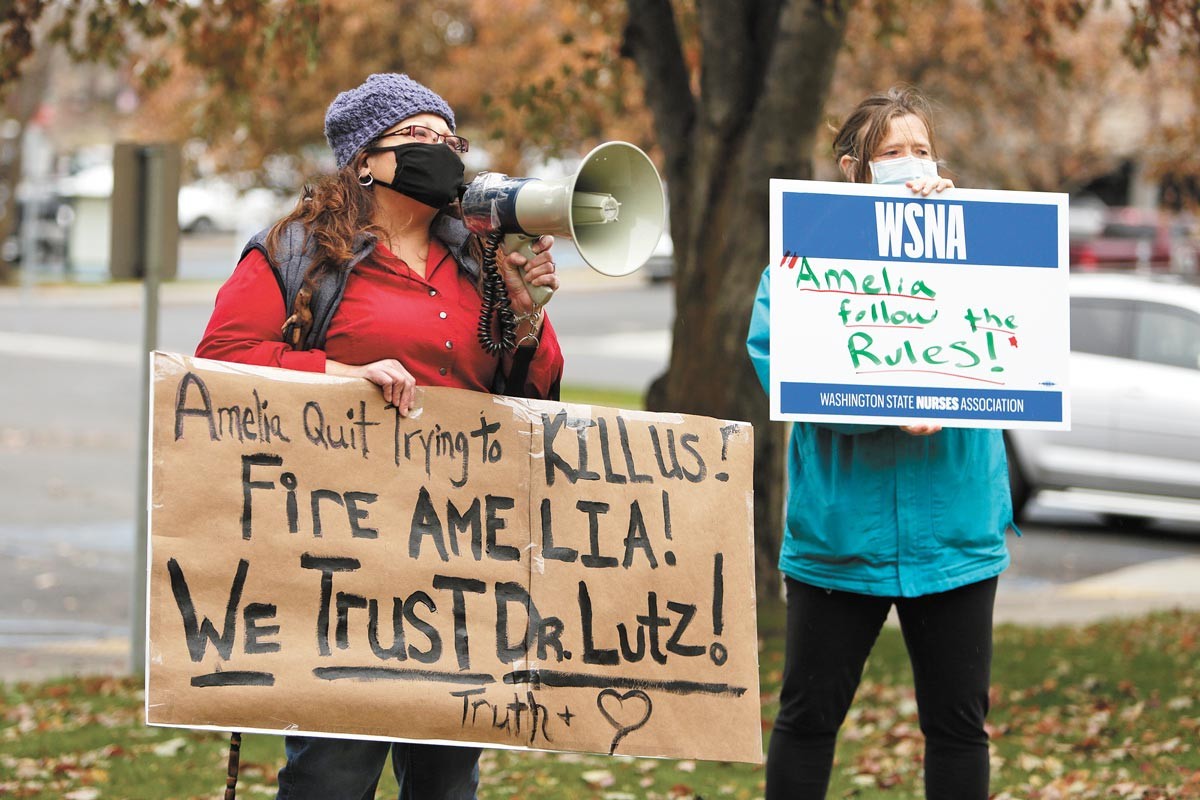
As Spokane County hastily housed COVID-19-positive community members in a new hotel at the start of September, Spokane Regional Health District staff immediately noticed the isolation facility was nowhere near the standards they'd grown accustomed to over the last year.
Mattresses and walls at the Rodeway Inn in Spokane Valley were yellowed and looked dirty. One client noted cockroaches in their room. Staff witnessed drug use nearby and were propositioned for sex by people in the area.
Increasingly concerned health district staff detailed the issues they'd witnessed in emails, which they sent to their managers and supervisors all the way up the chain to health district administrative officer Amelia Clark.
"We were put in a very unsafe environment to isolate people," one health district employee familiar with the situation tells the Inlander. "There was no infrastructure, no planning, no process."
After informing higher-ups of the situation, staff expected Clark and other agency heads to express shock at the conditions or offer another solution. After all, the previous rooms used at My Place hotel had worked well, and other hotels had been vetted.
Instead, employees were simply told this was the only option and it needed to work. Then, staffers were shocked by phone calls from managers "reminding" them that they shouldn't even list concerns like that in emails because emails are subject to public disclosure and could make the health district look bad.
Several current and former health district employees, who asked to remain anonymous for fear of retaliation, independently confirmed to the Inlander they were instead told to write those concerns in documents labeled "draft" — an attempt, they believed, to avoid disclosure under Washington's public records law.
One employee felt so uncomfortable with the potentially illegal directives — "I thought, 'Oh, hell no'" — that they documented their conversations while on the phone with supervisors. Some managers were also told (but refused) to "write up" staff who'd sent their concerns in writing.
"They got egg on their face and instead of saying, 'Thank you so much for saving us from a huge amount of trouble' they punished us for bringing it to their attention," one health district employee says. "We're like, 'This is not acceptable. The conditions we're putting people in are unsafe.'"
Clark did not respond to specific questions from the Inlander about the directive not to document concerns in emails. But in an emailed response to Protec17 union representative Suzie Saunders, Clark said she was unaware of such a policy.
The recent incident is just one example of what a dozen current and former health district staff describe as a "culture of fear" and a divide between the administration and staff that has grown within the Spokane Regional Health District since Clark was hired as administrator in September 2019. Some say that culture already existed but worsened after she took the helm.
Over the last two years, most of that during the COVID-19 pandemic, the health district has seen an exodus of its top management, with dozens of people representing hundreds of years of collective public health experience leaving their jobs. Some division directors retired early while other managers and staff left without a job lined up, citing the negative work environment as their reason for leaving.
Former and current district employees told the Inlander that Clark is dismissive of others' expertise, "autocratic" in her leadership style, and some said she encouraged managers to read a book about overcoming the "BMWs" or "bitching, moaning and whining" among unproductive employees. Bad interactions contributed to feelings among staff that their genuine concerns might be brushed off if brought to Clark's attention, and some worried that pointing out a problem would result in punishment.
"We keep thinking, 'Oh things can't get worse' and they just continue to get worse," says a district employee. "We're not allowed to ask questions without getting our hand slapped, and in some cases, formal write-ups."
Spokane isn't alone in hemorrhaging public health staff. Health departments around the nation have seen employees quit in droves. The pandemic only exacerbated existing issues with underfunded programs and political divisions. Nationwide, at least 303 public health leaders resigned, retired or were fired between April 1, 2020, and Sept. 12, 2021, according to tracking by the Associated Press and Kaiser Health News.
With cascading departures among other managers and lower level staff, experts say it could take years to rebuild public health systems around the country that are still coping with the ongoing waves of the pandemic.
Yet in Spokane, several who have left public health say that it's internal strife, driven by Clark and outside political pressure, that has pushed people away. If anything is going to change, they say, it starts there.
PRESSURE POINTS
After Clark and the local health board fired former health officer Dr. Bob Lutz in fall 2020, the divide between staff and leadership widened into a chasm.
Health district employees were distraught when they received an all-staff email on Oct. 30, 2020, simply informing everyone that Lutz was no longer the health officer.
While not everyone was a fan of his, Lutz was well-loved among many within the district, according to the employees the Inlander spoke to. Not only had he helped guide community decisions during the unprecedented time of the pandemic, but staff say that on a day-to-day basis he would happily hop in to help out a client with a health issue or answer their medical questions.
So when Clark announced Lutz's time was done, it left staff who were working closest on the pandemic wondering who could fill that void.
Many sent texts and emails to each other asking what Lutz could have done that would require he be fired in the middle of a pandemic, when the community needed a medical leader to guide decisions about things like reopening schools, operating businesses at limited capacity and safeguarding hospital capacity as a winter case spike was looming.
Immediately, some staff members took sick days and protested outside of their own workplace. Some quit soon after the health board's later 8-4 vote finalizing what Clark had already announced a week before.
Right after the vote to fire Lutz, the board appointed Dr. Francisco Velázquez — whose background is in building and selling medical businesses, not in public health — as interim health officer. Last week, on Oct. 6, the health board voted unanimously to hire Velázquez as the official health officer, at a salary of $247,000 per year.
Staff say "Dr. V." has been very kind and willing to learn about their programs, but they worry he lacks the public health expertise that Lutz had and the conviction to make tough calls when the community needs a public health advocate.
Due to the circumstances surrounding Lutz's departure, Clark faces an investigation from the state board of health, which in January will hold a hearing before an administrative law judge to determine whether she broke the law by firing Lutz before the board voted to do so.
But while much of the public and internal backlash has focused on Clark and her leadership style, not everyone is convinced that removing a head from the hydra will solve deep-seated issues at the district.
Before Clark was even hired, former health district associate director Ashley Beck (who left the district this summer) says she presented the local health board with a plan to hire a consultant to address conflict between the board, district leadership and staff back in 2018. At the time, Beck wrote a letter after seeing what she also described to the Inlander as a "culture of fear." But that pressure was largely driven by politics.
Almost by design, Washington's health districts face political pressure. Health districts and departments throughout the state are overseen by local health boards that are almost entirely filled with elected politicians. In smaller counties, the county commissioners make up the health board unless they pass their own local rule to add more community members to the board. Even then, Washington law requires the majority of health board members be elected officials. In more populated counties, a larger mix of elected officials make up local health boards, which hire the top officials (such as an administrative officer who reports to a health officer or vice versa) and make budget decisions.
To identify things that could be fixed, Beck proposed having an outside firm assess the culture within the health district, create a training plan for staff, and monitor employees, including the new administrator, to hold them accountable for the culture within the agency.
From Beck's perspective, district issues derive from a fear of political consequences and an eagerness to make decisions based on public perception and what will make health board members happy. Beck says the health board hasn't acknowledged its role in the problem.
"At no point have they understood that the way they speak to our leadership and the feedback they give our leadership plays a role in the culture," Beck says. "I believe that's the root cause of the fear-based culture."

Indeed, it doesn't seem like there is a politically, academically or ideologically balanced group making decisions for the health district in Spokane, says Jennifer Towers, who has researched public health communication and leadership for years.
Towers, who spoke as a Spokane community member and not on behalf of Gonzaga University where she's an assistant dean, says that unlike the East Coast communities she has lived in before, Washington appears to be somewhat unique in having so many politicians on local health boards as opposed to members with public health expertise.
"Having public health professionals — people that are trained in public health that have practiced public health — that also have a strong background in leadership would be important," Towers says. "The important thing with health is we have data to help us guide decisions."
But political pressure hit public health officials across the country particularly hard the past two years.
In her work as CEO of the National Association of County and City Health Officials, Lori Tremmel Freeman advocates for health department employees all over the country. Before the pandemic hit, public health had already seen about a 20 percent decline in staffing over the last decade as communities and the federal government underfunded departments, Tremmel Freeman says.
"What we saw during the pandemic pretty quickly is the losses started to gain more momentum," Tremmel Freeman says, "especially at the health officer level."
In early 2020, she says, three different health officers resigned from the association's board (which is made up of health officers) within just a six-week time period.
"All of those were due to the politics of the pandemic and the pressure on public health officials to do or not do certain things," she says. "And the overall pressure of being in that position to keep the community well."
Former Spokane health district data department manager Steve Smith says the politicized nature of public health during the pandemic was particularly difficult to navigate. Where something like the public health data department would normally fly under the radar, with COVID, it suddenly garnered intense attention.
"For a public health agency to have to wait for approval from our politicians just to do what is scientifically backed was terrible," Smith says of community decisions such as when would be appropriate to close down gatherings to prevent spread of the virus.
Smith and Beck are not the only high-level staffers to leave recently, and other managers have announced plans to leave before the end of the year. Currently, three of five division leader positions that report directly to Clark remain open, and several other management and staff-level positions have been vacated. The district lacks directors of community health, disease prevention and response, quality planning and assessment, and more.
"When you lose leadership in any company or agency at the top, it takes time to rebuild that," explains Tremmel Freeman. "Local health departments, because they've been under-resourced for so long, they don't have a bench to draw upon. There's no immediate replacement when a health officer leaves."
There's a similar difficulty filling other high-level positions.
"Our health departments are struggling to be able to keep up with the pandemic and keep our communities healthy and safe," Tremmel Freeman says. "Recruitment is difficult, the pay is often low, and then there's all these news stories about how difficult it is to be a public health employee, which is not helping. It is a position that is really for those most dedicated to serving their community, and replacing them is not easy."

VIEW FROM THE TOP
Clark declined an interview with the Inlander but sent a written statement that pointed to the pandemic and other stressors playing out nationally as contributing to the district's recent turnover. The pandemic took a toll on many health workers, including at SRHD, Clark writes, and she understands why many may have chosen to retire, leave for other jobs or even return to school to train for another career.
"It's also possible that decisions I have made at SRHD may have contributed to some decisions to leave, but of course, people change jobs for a wide variety of reasons," Clark writes. "I admire and respect everyone who works at SRHD. Their passion and dedication for ensuring the health and well-being of this community before, during — and someday, after — the pandemic is inspiring."
Clark writes that her leadership style is based on mutual respect and a common passion to serve the community, and says she values health district employees and their input.
"While I am sad to hear that a few may feel differently, I am more disappointed that they did not share those concerns with me," Clark writes.
Current and former staff who spoke with the Inlander were surprised to hear Clark felt concerns had not been shared with her, whether through exit interviews or internal discussions.
Former executive leadership team members Sheila Masteller and Lyndia Wilson have both written multiple letters to the local health board outlining concerning incidents between Clark and other staff members, and both have called on the board to assess Clark's performance.
Wilson, who started at the agency in 1991 and retired in July, has directly asked the board to fire Clark, citing numerous incidents she witnessed or was told about by subordinates.
Wilson says that initially, she and others tried to understand the struggles Clark faced after moving to Spokane from the Midwest and jumping into public health work for the first time. Wilson tried to figure out the most effective ways to translate staff concerns to Clark but says she ultimately struggled, feeling that Clark was set in her ways.
While the pandemic undoubtedly increased stress for everyone, Wilson says many employees continue to share their stories with her as they plan to leave, and the common theme is that people don't feel listened to or worry they'll be punished for doing their jobs.
"You have a very passionate set of staff that work at Spokane Regional Health District. They love what they do, and they love being a part of the solution. They're working their butts off, long hours, working weekends and all of that," Wilson says. "But they're not getting the recognition or the belief that they're doing the right thing by her."
Those who have left did so because of the negative environment, Wilson says.
Masteller, who retired in February 2020, says she left within months of Clark's arrival when it was clear that Clark wasn't interested in learning from the expertise of the existing leadership team. Masteller spent more than three decades working in leadership roles at Providence, Cancer Care Northwest and then the health district, and says she offered to introduce Clark to experts in the region.
"I told her, 'I'm happy to introduce you to colleagues at MultiCare, Providence and the universities,' and she said, 'No, I'll be OK,'" Masteller says. "So many programs from the district are not done in isolation, which is why I think it's really important that your executive officer have relationships with the community."
Clark did, however, focus her attention inward at the organization, closely monitoring messaging that comes from the health district. Some of her issues with Lutz centered on opinion pieces he authored that ran in the Spokesman-Review. Masteller notes that even managers at the highest level were told they had to let Clark review every single letter they planned to send out.
Masteller says she also had subordinates come to her with concerns of bullying and Clark's "autocratic" top-down leadership style.
"I've talked with managers after they've left a meeting with her and they're just crying, sobbing about what she said," Masteller says. "The big concern [as people leave] is the loss of the deep expertise in public health and in particular the impact on the services in the community."
But when it comes to the turnover, Spokane County Commissioner Al French, a long-time health board member, says he thinks it's not unusual that when an agency structure is changed, people who disagree with that change will leave. Those who agree, he says, will stay.
Clark was brought on after the health board swapped from having the health officer overseeing the entire district and an administrator, to having an administrative officer oversee the entire district, including the health officer.
"In the 19 years I've been on the health board, she's been the best administrator I've seen," French says. "It's unfortunate that her service to this county was marred by Dr. Lutz and his termination, but that doesn't distract, in my opinion, the quality of work that she's doing."
French says he's only heard concerns about Clark from a few people, not across the board, and he hasn't seen anything about Clark's management style or demeanor that he finds concerning.
CHANGE ON THE HORIZON
One of the questions remaining for many health district staff is whether Clark intends to make significant cuts to the organization. Washington state law requires that health departments provide essential public health functions such as tracking the spread of communicable diseases, overseeing cleanliness in dining establishments and monitoring things like sewer permits.
But the Spokane Regional Health District offers many other community programs that aren't required by law. For example, the Nurse-Family Partnership program pairs health district nurses with high-risk moms-to-be. The district is able to offer home visits and help people with things like employment as they work to improve the number of successful births, improve early childhood development and ideally create healthier family environments for children who would otherwise be at risk of adverse experiences.
The Spokane program has been recognized as one of the most successful in the state, Masteller says, but she worries it and other programs could be considered for cuts in the future. The health district is currently going through its annual budget cycle. During a Sept. 30 meeting, health board members noted that the district faces a nearly $3.5 million deficit, when you don't consider the money it receives from Spokane County.
French says he hasn't been shy about expressing his discomfort with the amount the county spends to fund the district. Typically, that's about $1.5 million to $2 million per year. The county's contribution for legally required programs this go-around would reduce the district's expected budget shortfall by more than $1 million.
"Let's do what the law requires us to do first, focus on those responsibilities, and then if there are other things we want to engage in, let's find a way to pay for them," French says. "Keep in mind that the only local governmental entity that contributes money to the health district is the county. The cities do not contribute a dime."
If cities, which put a larger strain on some health district programs, want additional offerings to continue, French says, they should help pay for that. Budget discussions will continue in coming weeks.
In the meantime, recent changes at the state level could address some of the political makeup of the health board to ensure that medical voices play a stronger role in decisions guiding the health district. Inspired by Lutz's ouster, some community members worked with state Rep. Marcus Riccelli, D-Spokane, to pass HB 1152 this spring. The new law requires that local health district boards have at least some members from the medical community, people who use public health services, and other community stakeholders such as business owners or nonprofit employees.
The hope is that boards will include more medical expertise and diversity of opinion.
"I think our state is in a position where we can lead and innovate in what we do in terms of how we improve the public health system to better support and protect its employees and managers," Beck says.
On a national level, Tremmel Freeman says, perhaps communities can leverage the recent attention focused on public health to protect important services.
"People are more aware of what public health is and what it means," Tremmel Freeman says. "We have to use this moment to catalyze support for public health in the future."
Change within the Spokane Regional Health District will likely depend on who gets to determine those additional health board members, how Clark's hearing before the state board of health goes in January, and whether staff and administration can repair their relationship.
"The whole culture of the health district felt very divided, it didn't feel like we had the common goal of helping people anymore," says Hannah Portlock, a nurse who recently left the district. "There are so many people who really care about the community at the health district. But it's hard to do your job when there's division, it makes bureaucracy even more complicated." ♦
ABOUT THE AUTHOR
Samantha Wohlfeil covers the environment, rural communities and cultural issues for the Inlander. Since joining the paper in 2017, she's reported how the weeks after getting out of prison can be deadly, how some terminally ill Eastern Washington patients have struggled to access lethal medication, and taken readers inside hospitals overwhelmed with COVID-19 patients.

Nearly a year after the controversial ouster of Spokane County Health Officer Bob Lutz, the Board of Health hired a permanent replacement last week following the recommendation of administrator Amelia Clark.
Frank Velázquez, who has served as interim health officer since last fall, will stick around as health officer in Spokane.
"Dr. Velázquez was the most qualified of all applicants and performed well in multiple panel interviews," Clark says in a press release.
Velázquez previously did not have a background in public health, though he has noted that he has a master's degree in Healthcare Management and Policy from Harvard University School of Public Health. He served as CEO of Pathology Associates Medical Laboratories before the company was sold to LabCorp. When named interim health officer last year, Velázquez admitted he didn't initially know what he agreed to do. But now, he says he's fallen in love with the job.
"I realized that I wanted to continue this journey and remain a part of the team here at the health district," Velázquez says. "I am very thankful to have the opportunity to do so."
Lutz, meanwhile, took a role last year as a medical adviser for Washington's COVID-19 response, which he maintains to this day. ♦ (WILSON CRISCIONE)
















